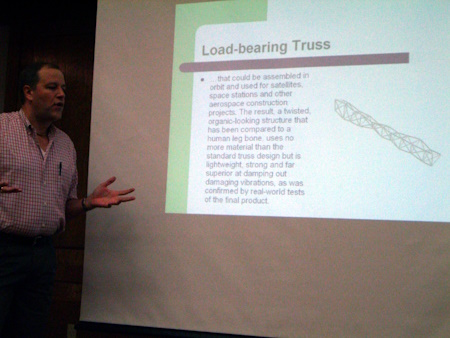On Labor Day weekend, envious of all those cool people who were either at the WorldCon or at the Burning Man, I had to console myself by going to LoneStaRG, a Mensa regional gathering. I spent half a day there (out of 4 possible total). That was about the right amount of time. There were very few costumes at this year's LoneStaRG, and overall it just wasn't as lively as last year. But our air conditioning at home had gone out that weekend, and LoneStaRG seemed as good a place as any to go to recover from the heat.
When Mensans get together, their collective IQ sometimes takes a hit
I overheard a few funny stories at the LoneStaRG. Somebody said he received an offer for a credit card, co-branded by Mensa, with an 24.99% APR. "Whoever Mensa sold members' addresses to, clearly didn't have a good idea who they were dealing with", said the "lucky" recipient of the offer. Because you know, Mensans are way too ridiculously smart to fall for something like that.
Or are they? I got contradictory impressions of the people at the gathering. Many of them are individually as smart as advertised, and quirky enough to make you scratch your head (in a good way). But... when they get together, it sometimes looks like their collective IQ takes a hit.
You get discussions where 30 people sit around and re-hash the obvious. For example, they may devote 15 minutes to stating and re-stating the idea that symbols in general, and brands specifically, serve as shortcuts for people to make decisions about the world. A symbol stands for something; hence, seeing a symbol, a person makes a rapid decision without having to analyze the phenomenon. So what else is new? Everyone is in violent agreement, and no one offers a different perspective. I don't know about all the group discussions at LoneStaRG, but this one discussion I'm thinking about was very much like this.
So, the quality of group discussions seemed less than the sum of the quality of their contributing minds. But the individual people were often funny.
Stories too good to be true
Somebody told the story of a guy who figured out a unique way to bring his shoes into a foreign country. You see, he found it impossible to buy shoes in his size (13) in that country. No stores had them. He brought some footwear from the US, but when it wore out, he was left in a quandary. He could ask his friends in the US to send him shoes, but then he would have to pay exorbitant tarifs imposed on foreign goods. So he asked friends to mail him two separate packages containing a single shoe each. His host country's customs officers didn't know what to make of a package containing a single shoe, so they let him have it without imposing a tariff. Whether that's believable or not, I can't tell. It sounds a bit too much like one of those apocryphal tales of out-of-the-box thinking, that management books are rife with.
Don Baker's talk on Universal Darwinism
One of the more interesting things at the LoneStaRG was ACA's own Don Baker's presentation "Universal Darwinism: How Computer Science has Validated the Theory of Evolution". It can be summed up in a few sentences thus. Computer simulations can help to study evolution, which is hard to study otherwise, because it occurs very slowly in nature. The benefit flows both ways: the principles of evolution applied to computer science have lead to creation of a class of algorithms called genetic algorithms. I have to admit, I've already heard or read most of the points mentioned in his talk (as is more and more often the case with public science lectures I go to. Is that a downside of ed-joo-ma-cating myself, or what? But it was neat to see them summed up all in one place. The most interesting part of the talk were examples of designs that genetic algorithms have come up with, such as the hemispherical coverage antenna, and the load-bearing truss.


No comments:
Post a Comment